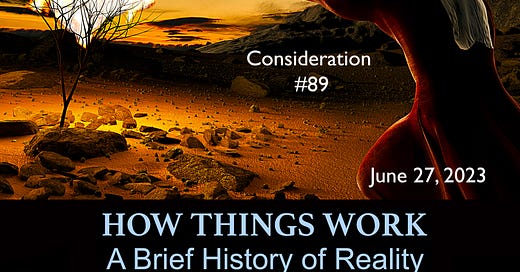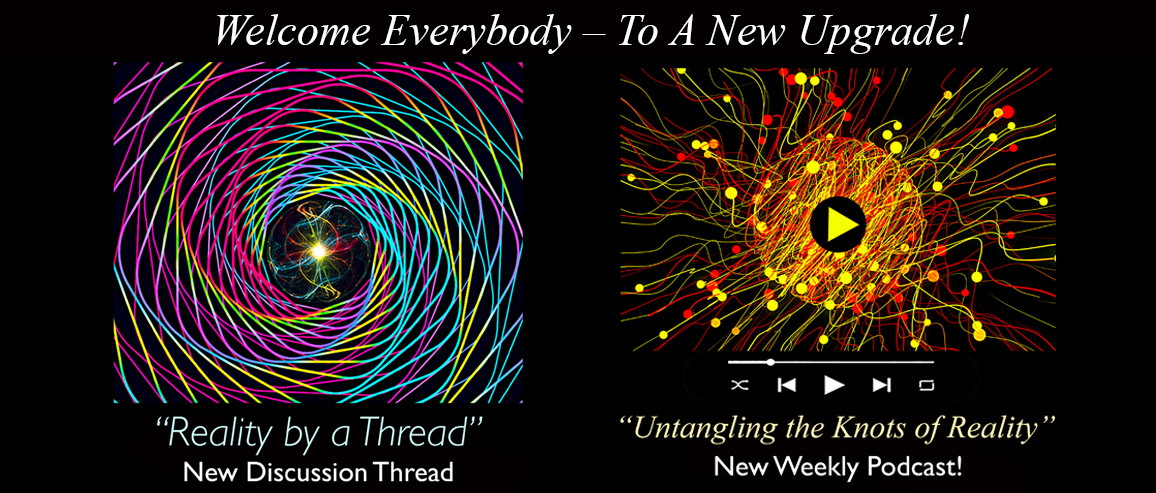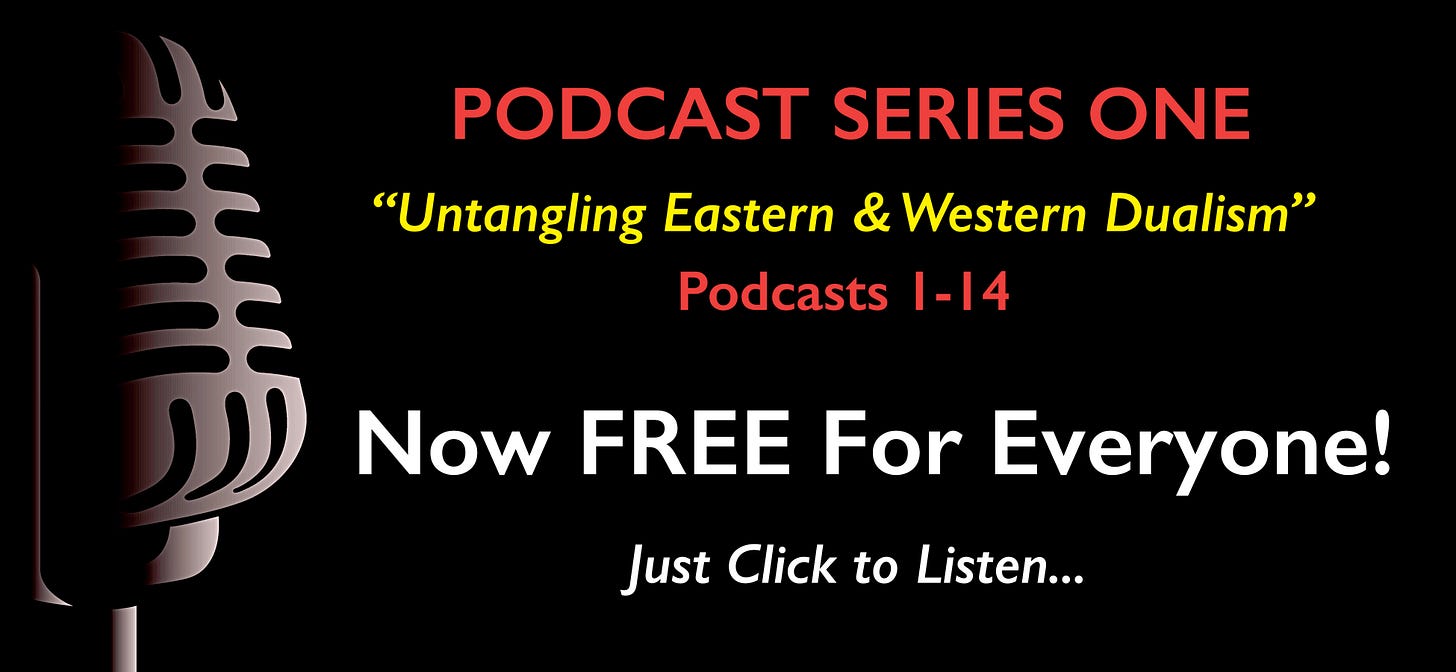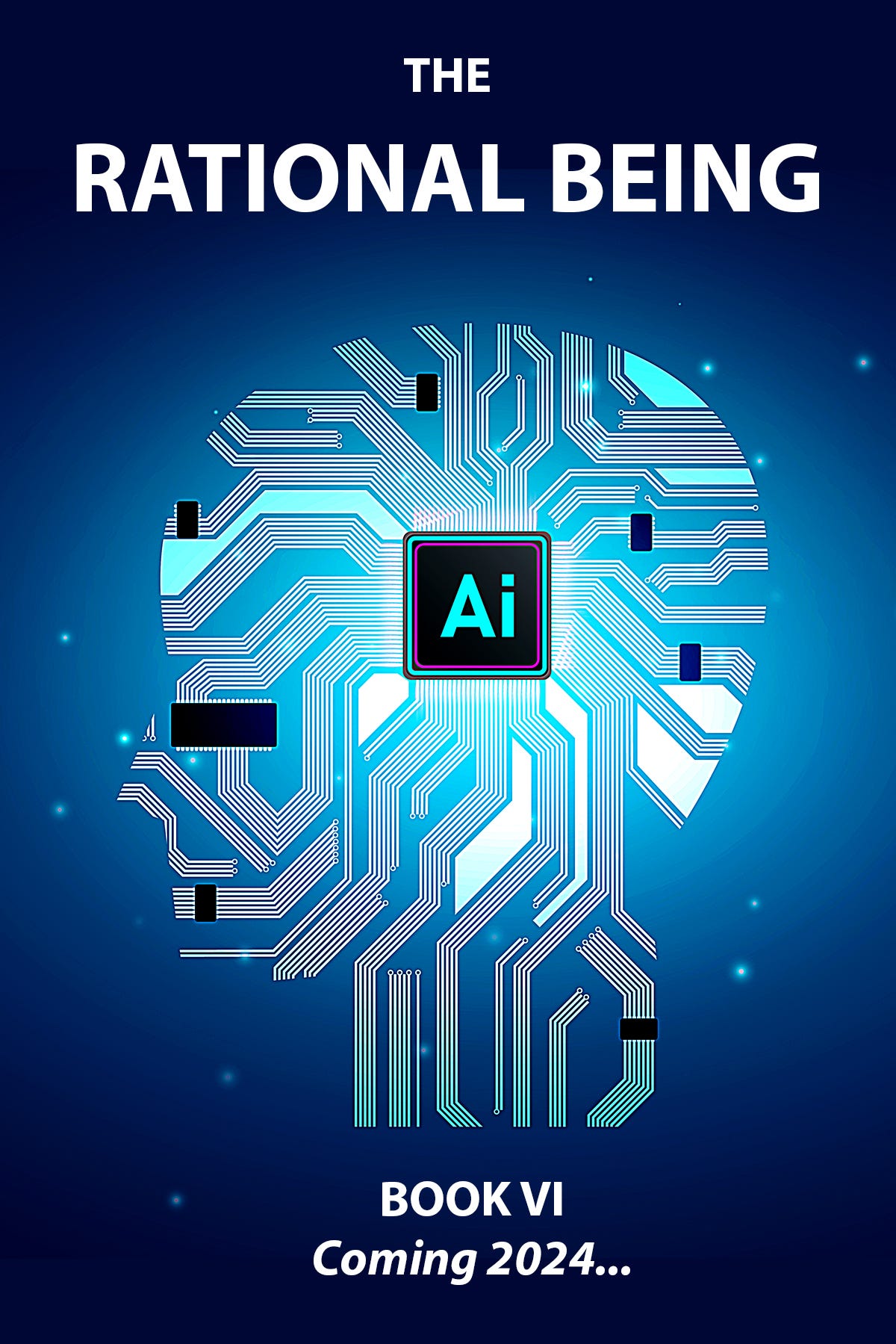How Things Work: A Brief History of Reality
BOOK II: The Power of Three (Science & Religion) – Consideration #89. "A Reluctant Moses"
Be a part of the Conversation!
Tuesday June 27, 2023
“Earth's crammed with heaven, And every common bush afire with God: But only he who sees takes off his shoes.”
– Elizabeth Barrett Browning
PREFACE
Welcome Everybody!
The Moses we meet in the beginning of Exodus is not bold, courageous, or particularly strong in faith. Over and over, he protests that “he” is definitely not the person God is looking for. However, God believes that he is.
“Moses’ first encounter with the God of Abraham is a negative experience with him consistently expressing why God is wrong…”
In one of the most famous stories in the Bible, Moses first encounters God as a “burning bush” who speaks to him directly. However, Moses seems to be more intimidated than “awed” by this divine vision. Essentially, wanting no part of it!
Moses’ first encounter with the God of Abraham is a “negative” experience with Moses consistently expressing why God is “wrong” about His decision to use him as the instrument of divine prophecy. While Abraham had argued with God over why he had no children, Moses argues with God that He is mistaken; “Moses” wasn’t the prophet God was looking for.
In his first encounter with the God of Abraham, we tend to believe he is right.
CONSIDERATION #89 – “A Reluctant Moses”
(Exodus 3–4)
One day, while tending his sheep, the “angel of the Lord” appeared to Moses as flames within a bush that was not consumed by them:
“Moses saw that though the bush was on fire it did not burn up.”
Exodus 3:2
So, Moses decided to investigate this “strange sight” of a burning bush that wasn’t consumed by the fire. When God sees Moses coming closer toward the burning bush, He stops him:
When the Lord saw that he had gone over to look, God called to him from within the bush, “Moses! Moses!”
And Moses said, “Here I am.”
“Do not come any closer,” God said. “Take off your sandals, for the place where you are standing is holy ground.” Then he said, “I am the God of your father, the God of Abraham, the God of Isaac and the God of Jacob.” At this, Moses hid his face, because he was afraid to look at God.
Exodus 3:4-6
God explains to Moses, that He has heard the cries of the Israelites and is here to rescue them from their suffering. By sending Moses to confront the Pharaoh of Egypt:
The Lord said, “I have indeed seen the misery of my people in Egypt. I have heard them crying out because of their slave drivers, and I am concerned about their suffering. So I have come down to rescue them from the hand of the Egyptians and to bring them up out of that land into a good and spacious land, a land flowing with milk and honey – the home of the Canaanites, Hittites, Amorites, Perizzites, Hivites and Jebusites. And now the cry of the Israelites has reached me, and I have seen the way the Egyptians are oppressing them. So now, go. I am sending you to Pharaoh to bring my people the Israelites out of Egypt.”
Exodus 3:7-10
Needless to say, Moses is somewhat stunned by this event. He questions God’s judgement by indicating that he, Moses, might not be the right man for the job.
“Who am I that I should go to Pharaoh and bring the Israelites out of Egypt?”
Exodus 3:11
God essentially assures Moses that He will be with him. However, Moses remains hesitant:
“Suppose I go to the Israelites and say to them, ‘The God of your fathers has sent me to you,’ and they ask me, ‘What is his name?’ Then what shall I tell them?”
Exodus 3:13
God’s answer to this question has tremendous theological implications, particularly later in the New Testament.
“I am who I am. This is what you are to say to the Israelites: ‘I am has sent me to you.’”
Exodus 3:14
Once again, God suggests that there may be a few difficulties along the way, but like with Abraham, He, not Moses, would provide whatever means was necessary for success. All Moses had to do was have faith and obey.
But I know that the king of Egypt will not let you go unless a mighty hand compels him. So I will stretch out my hand and strike the Egyptians with all the wonders that I will perform among them. After that, he will let you go.
“And I will make the Egyptians favorably disposed toward this people, so that when you leave you will not go empty-handed”.
Exodus 3:19-21
However, Moses is still hesitant.
“What if they do not believe me or listen to me and say, ‘The Lord did not appear to you’?”
Exodus: 4
Because Moses would not obey God’s words, God provides a miracle to overcome his resistance. However, there will be a cost for his constant doubts. Moses, repeating over and over that he cannot succeed in God’s mission is expressing a lack of faith in God. Notice that Moses is obsessed with the idea that no one will believe him, because he, himself, does not believe God.
Then the Lord said to him, “What is that in your hand?”
“A staff,” he replied.
The Lord said, “Throw it on the ground.”
Moses threw it on the ground and it became a snake, and he ran from it. Then the Lord said to him, “Reach out your hand and take it by the tail.” So Moses reached out and took hold of the snake and it turned back into a staff in his hand. “This,” said the Lord, “is so that they may believe that the Lord, the God of their fathers—the God of Abraham, the God of Isaac and the God of Jacob—has appeared to you.”
Exodus 4:2-5
God having to prove Himself with a miracle does not make Him happy. What God says next is really not just a warning for the Egyptian Pharaoh, it is a warning for Moses as well, even if he doesn’t recognize it.
Then the Lord said, “Put your hand inside your cloak.” So Moses put his hand into his cloak, and when he took it out, the skin was leprous – it had become as white as snow.
“Now put it back into your cloak,” he said. So Moses put his hand back into his cloak, and when he took it out, it was restored, like the rest of his flesh.
Then the Lord said, “If they do not believe you or pay attention to the first sign, they may believe the second. But if they do not believe these two signs or listen to you, take some water from the Nile and pour it on the dry ground. The water you take from the river will become blood on the ground.”
Exodus 4:6-9
Even though God has clearly stated that someone who doesn’t pay attention, or believe you, after two chances is asking for big trouble, Moses continues to make excuses:
“Pardon your servant, Lord. I have never been eloquent, neither in the past nor since you have spoken to your servant. I am slow of speech and tongue.”
Exodus 4:10
After claiming he can’t possibly help God because he isn’t a good speaker, God begins to lose patience with Moses.
“Who gave human beings their mouths? Who makes them deaf or mute? Who gives them sight or makes them blind? Is it not I, the Lord? Now go; I will help you speak and will teach you what to say.”
Exodus 4:11-12
However, Moses is still not assuaged, even after multiple miracles and being berated by Almighty God Himself, he finally just says “No!”
“Pardon your servant, Lord. Please send someone else.”
Exodus 4:13
God must have really wanted Moses for this job, because even though He is fuming with frustration over Moses’ reaction He still encourages him to continue:
“What about your brother, Aaron the Levite? I know he can speak well. He is already on his way to meet you, and he will be glad to see you. You shall speak to him and put words in his mouth; I will help both of you speak and will teach you what to do. He will speak to the people for you, and it will be as if he were your mouth and as if you were God to him. But take this staff in your hand so you can perform the signs with it.”
Exodus 4:14-17
For some reason, perhaps because Moses is a necessary part of the process, God does not come across as so wrathful here. He reassures Moses that He will talk to him, then Moses will share with his brother the words that God tells him, and his brother Aaron will actually speak to the people. He also promises to train and teach both of them what they needed to say and do. Then, He gives Moses a “miracle staff” to “perform signs” as proof of God’s power.
This concludes the first conversation between God and Moses.
POSTSCRIPT
In the beginning of Exodus, we are introduced to a fearful, weak, and ineffectual Moses, reflecting the natural state of human beings who are separated from the power, authority, and will of God. As Moses gives up his attachment to his “old” self and moves toward “unity” with God he “inherits” and begins to manifest the qualities of power, authority, and will into his own empirical experience of reality. The essential theological lesson from this first encounter is that by giving up our inferior experience of reality and embracing a more divine reality we become more like God; the more we accept the reality of God, the more our empirical experience reflects that reality.
“As Moses gives up the negative qualities that make up ‘Moses’ and replaces them with the positive qualities demanded by God, the more ‘God-like’ Moses becomes.”
In the New Testament, Jesus would use this same spiritual irony to suggest that before you could conquer death; you first had to die. Therefore, the Old Testament, the New Testament, and even the basic tenets of Taoism and Buddhism, all suggest that “death,” or willingness to give up your personal “self” and embrace a “higher self,” is a prerequisite to accessing a higher, more divine, experience of reality. As Moses gives up the negative qualities that make up “Moses” and replaces them with the positive qualities demanded by God, the more “God-like” Moses becomes. The reality of Moses and the reality of God cannot be simultaneously maintained within a single individual.
Like in the Garden of Eden, the choice between good and evil, or sacred and profane, becomes the ultimate spiritual choice in the life of all human beings. Following our own individual will leads to weakness, fear, and isolation; however, following a “higher will” leads to strength, power, and authority. For God to appear; you must first disappear. It also continues the Biblical motif of moving from a “weak,” or “helpless,” position into a strong and powerful position of authority once “God’s will” has been accepted and implemented. Moses follows a character arch that supports these theological concepts.
“The world of the spirit is limitless and eternal and capable of manifesting an intangible consequence called ‘usefulness.’”
In Taoism there is a distinction between the empirical world of physicality and the rational world of potentiality, or possibility. Our empirical physical reality, including our “physical” self, manifests empirical consequences called “benefits,” which are tangible and objective. However, they are also limited.
In a purely rational reality of complete potential possibility there are no physical limitations. The world of the spirit is limitless and eternal and capable of manifesting an intangible consequence called “usefulness.” In this spiritual formula, the more you experience the reality responsible for unlimited usefulness, or potential, the more divine benefits become objectively manifested into physical reality.
Thirty spokes share the wheel's hub;
It is the center hole that makes it useful.
Shape clay into a vessel;
It is the space within that makes it useful.
Cut doors and windows for a room;
It is the holes which make it useful.
Therefore benefit comes from what is there;
Usefulness from what is not there.Lao Tzu – Tao Te Ching #11
In the beginning of Exodus, Moses does not believe he can produce benefits in the physical world and is basically “useless” to God; he is not empty, he is full of “himself.” However, by accepting the possibility of a higher potential, beyond himself, Moses taps into the rational, spiritual reality of unlimited possibility and potential capable of bringing “extraordinary benefits” into the physical world. Theologically, in order to grow spiritually, we must continually be willing to let go of our “lesser self” in exchange for the possibility and potential for a “greater self” to occur.
The Biblical idea of a “power” and “authority” beyond our own eventually merges with Greek ethics, metaphysics, and virtues to become the foundation for the philosophers, scientists, and political thinkers during the Age of Reason leading to the concepts of Self Evident Truth, the Scientific Method, Inalienable Rights, and the Declaration of Independence.
Next week the narrative continues when Moses frees the Israelites from the Bondage of Egypt and leads them into the desert on a forty-year exodus into the land God had promised to Abraham and his descendants in Genesis…
This Week on “The Thread”…
Excerpt from Tomorrow’s Untangling the Knots of Reality – Podcast #50: "Untangling Abraham Lincoln and the Civil War" (Part 2– The Foundational Flaw of America)
Expand the Conversation by Upgrading to “Reality by a Thread!”
•Untangling the Knots of Reality: Podcast #50 “The Foundational Flaw of America: Part-2 – Abraham Lincoln and the Civil War” (“Like Washington, Lincoln was a President who understood and felt the weight of history on his Presidency. And like Washington, Lincoln rose to the occasion. After becoming the first President ever elected without a single vote from a “slave” state; the southern states seceded from the United States to form the Confederate States of America. Lincoln found himself the President of a broken Union. The crack in the foundation of America had finally split the nation apart; the Civil War had begun…”)
• “Reality by a Thread” Discussion Thread: BOOK VI PREVIEW – “The Rational Being” (“The dilemma we find ourselves in regarding Artificial Intelligence is that we are on the verge of creating a digital consciousness that we do not yet fully understand; is likely to be more sophisticated, powerful, and effective than human consciousness; may be uncontrollable, uncontainable, and intractable; and then giving it complete sovereignty and control over everything we depend on to survive. What could possibly go wrong?”)
•FREE PDF Download of Book IV: “The Cosmic Symphony – Overtones of String Theory” plus other Free Books, Discounts and Benefits. Also Gain Complete Access to all Previous Podcasts and Threads!
UPGRADE NOW!
Available Now!
Excerpt from PODCAST #3: "Untangling the Garden of Eden""
If you find yourself growing tired of the same old meaningless fluff, this may be the Podcast you’ve been looking for!
Podcast #1 – A Lot of Explaining
Podcast #2 – Untangling Mathematics & Metaphors
Podcast #3 – Untangling the Garden of Eden
Podcast #4 – Untangling The Physical World
Podcast #5 – Untangling the Five Senses
Podcast #6 – Untangling Eastern & Western Dualism
Podcast #7 – Untangling Zen & the Shaolin Temple
Podcast #8 – Untangling the Mystery of Taoism
Podcast #9 – Untangling The Noble Eightfold Path
Podcast #10 – Untangling Plato's Realm of Forms
Podcast #11 – Untangling Aristotle's Metaphysics
Podcast #12 – Untangling Happiness & Virtues
Podcast #13 – Untangling Self-Evident Truths
Podcast #14 – Untangling The Cosmic Symphony
“Untangling the Knots of Reality – Be A Part of the Conversation!”







